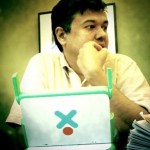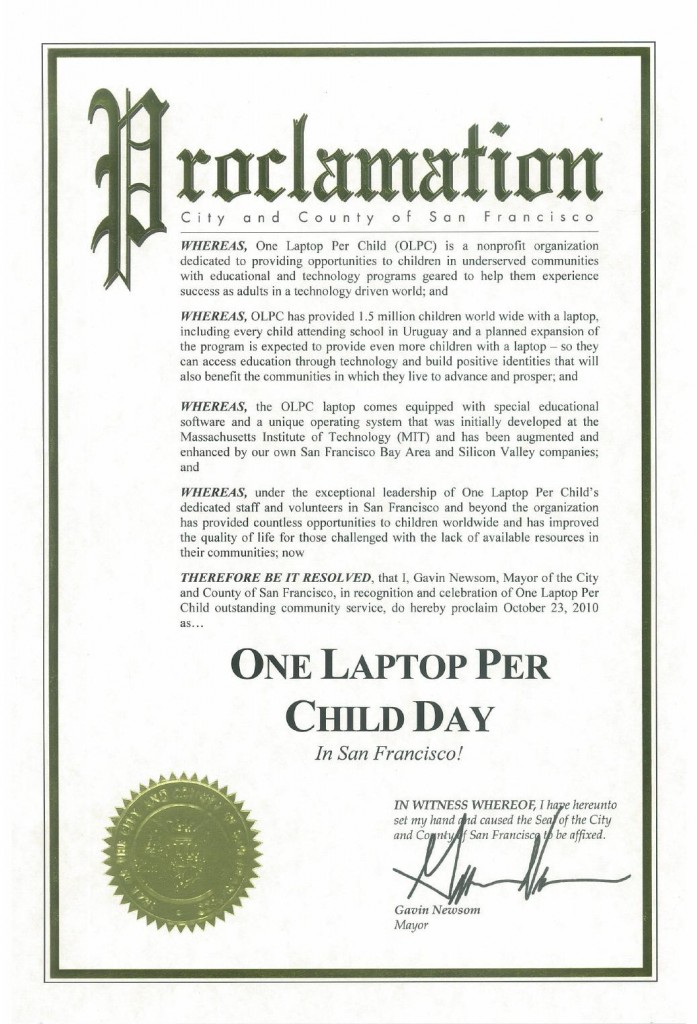I’ve lost count of how many times the demise and resurrection of OLPC and Sugar have been proclaimed and celebrated. What makes these projects tick? Grow?  I ask myself this question whenever I start feeling burned out, wondering why I remain attached to the project and this green machine.

Sameer Verma with XO
My own journey with OLPC, Sugar and all things related, has been underway for years. I’m a techie at heart, a “thinly-disguised” business school professor, teaching IT strategy and researching business models and consumer behavior. Every once in a while, I’ll sit down and compile a kernel, or run a packet sniffer. Â (What can I say? It’s instant gratification and a lot more fun 🙂
I think of the tech as the supply side of my interest: The XO makes for a great technology platform. The mesh (whether 802.11s or ad-hoc), suspend with the screen lit, robustness, low power, etc. is all very cool. Cool enough for a grown man to walk around with a funny-looking green machine slung around his shoulder. Â The software stack too is amazing, flexible, free. The content is rich. Wikipedia in a box? Awesome! The tech definitely keeps me tethered.
Then there’s the demand side: a part of my family lives in rural India, in Bhagmalpur. A village where I have seen the simple life. Clean air, good food, quiet living. Its also stricken with poverty, sanitation issues, water shortages, and seriously untapped ingenuity.

Maggu at home
As a kid, I used to hang around Maggu, while he milked a water buffalo, or Bahadur, while he made gold jewelry on a block of coal. Today I wonder what Maggu would do if he could learn about the rest of the world and its dairy achievements. How Bahadur’s family could save the lost art of rural goldsmiths. Would they benefit from a peek into that Wikipedia in a box? You bet. In my mind, I can savor the possibilities of the supply, and imagine what it can do for the demand. I speak with my friend Javier Cardona about IEEE 802.11s, with Maggu on my mind. These worlds must meet.
Finally, there’s the catalyst: my daughter Mira, now age five. She could open the XO, power it on, and turn it around into tablet mode when she was two. At three, she could play Implode on the XO with a finesse that amazed me. Children are like sponges; they soak up everything, and have incredibly simple solutions in their heads. Â I cherish Mira’s curiosity and ingenuity, and she has been my catalyst for inspiration.
So that is my supply, my demand, and my catalyst. My story and my guide.

Mira hard at work
Every volunteer has her own story. Many come and go, some stay, but all leave a mark on the overall process. They all help us steer projects in new and meaningful ways. For instance, a little over two years ago in Austin the
XO manual was written by volunteers to pave the way for a new kind of global user. Â Sugar hackers and tech writers of all flavors funded their own way to Austin, to gather and create a resource that is used everywhere today.
A year later, volunteers ganged up in Washington, DC (again on their own dime) to create 30+ OLPC community deployment success stories, compiled into the “Class Acts” repository of tips & tricks. Â I’ve dipped into this pool myself, asking my students to convert some of these into one-pagers. If you need a handout for a neighbor or school principal, grab this and print it!
And now we’re preparing for a larger community event, with volunteers from all parts of the movement and from around the world, at the OLPCSF Community Summit. Stay tuned for details and a summit update tomorrow.
Sameer Verma is the chief organizer of the OLPC SF community. He is also Associate Professor of Information Systems in the College of Business at San Francisco State University.





